#horse motif
Text
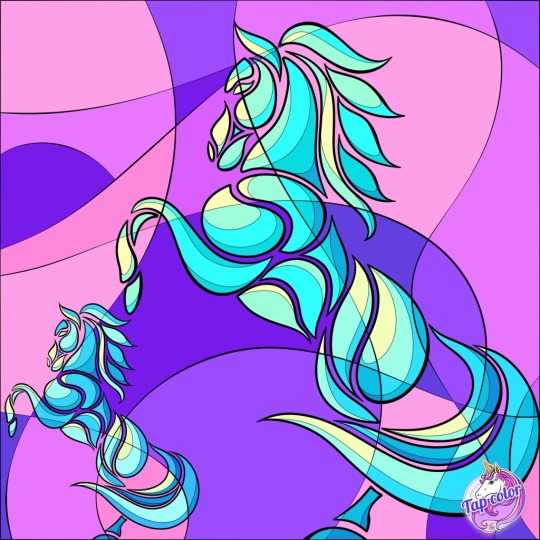
🐎🐎
#Horse#Horses#Horse Motif#Horse Motifs#Animals#Design#Art#App#Adult Colouring Book#Adult Coloring Book#Tap Color - Color By Number#My Post
0 notes
Text

Snuff Bottle. Chinese origin, made during the Qianlong reign period (1736–1795) of the Qing Dynasty (1644–1911). Medium is pink glass with white and black overlay. Dimensions: h. 7.3 cm x w. 6.0 cm x d. 2.8 cm. From the Princeton University Art Museum, object number: y1936-539.
(Source: artmuseum.princeton.edu)
#bottle#vessels#1700s#18th century#qianlong period#qing dynasty#chinese design#animal motif#horses#glass#pink#white
324 notes
·
View notes
Text

trixie lulamoon redesign because i finally figured out how to draw ponies
#mlp#my little pony#mlp fim#my little pony friendship is magic#trixie mlp#trixie lulamoon#i tried to give her miniature horse proportions because i feel like she'd be very tiny..#also a lot of crescent moon and star motifs
126 notes
·
View notes
Text
I have a lot of complicated feelings when it comes to what Neflix has done with the Witcher, but my probably least favourite is the line of argumentation that originated during shitstorms related to the first and second season that I was unlucky to witness.
It boils down to "Netflix's reinterpretation and vision is valid, because the Witcher books are not written to be slavic. The overwhelming Slavic aestetic is CDPR's interpretation, and the setting in the original books is universally European, as there are references to Arthurian mythos and celtic languages"
And I'm not sure where this argument originated and whether it's parroting Sapkowski's own words or a common stance of people who haven't considered the underlying themes of the books series.
Because while it's true that there are a lot of western european influences in the Witcher, it's still Central/Eastern European to the bone, and at its core, the lack of understanding of this topic is what makes the Netflix series inauthentic in my eyes.
The slavicness of the Witcher goes deeper than the aestetics, mannerisms, vodka and sour cucumbers. Deeper than Zoltan wrapping his sword with leopard pelt, like he was a hussar. Deeper than the Redanian queen Hedvig and her white eagle on the red field.
What Witcher is actually about? It's a story about destiny, sure. It's a sword-and-sorcery style, antiheroic deconstruction of a fairy tale, too, and it's a weird mix of many culture's influences.
But it's also a story about mundane evil and mundane good. If You think about most dark, gritty problems the world of Witcher faces, it's xenophobia and discrimination, insularism and superstition. Deep-seated fear of the unknown, the powerlessness of common people in the face of danger, war, poverty and hunger. It's what makes people spit over their left shoulder when they see a witcher, it's what makes them distrust their neighbor, clinging to anything they deem safe and known. It's their misfortune and pent-up anger that make them seek scapegoats and be mindlessly, mundanely cruel to the ones weaker than themselves.
There are of course evil wizards, complicated conspiracies and crowned heads, yes. But much of the destruction and depravity is rooted in everyday mundane cycle of violence and misery. The worst monsters in the series are not those killed with a silver sword, but with steel.
it's hard to explain but it's the same sort of motiveless, mundane evil that still persist in our poorer regions, born out of generations-long poverty and misery. The behaviour of peasants in Witcher, and the distrust towards authority including kings and monarchs didn't come from nowhere.
On the other hand, among those same, desperately poor people, there is always someone who will share their meal with a traveller, who will risk their safety pulling a wounded stranger off the road into safety. Inconditional kindness among inconditional hate. Most of Geralt's friends try to be decent people in the horrible world. This sort of contrasting mentalities in the recently war-ridden world is intimately familiar to Eastern and Cetral Europe.
But it doesn't end here. Nilfgaard is also a uniquely Central/Eastern European threat. It's a combination of the Third Reich in its aestetics and its sense of superiority and the Stalinist USSR with its personality cult, vast territory and huge army, and as such it's instantly recognisable by anybody whose country was unlucky enough to be caught in-between those two forces. Nilfgaard implements total war and looks upon the northerners with contempt, conscripts the conquered people forcibly, denying them the right of their own identity. It may seem familiar and relevant to many opressed people, but it's in its essence the processing of the trauma of the WW2 and subsequent occupation.
My favourite case are the nonhumans, because their treatment is in a sense a reminder of our worst traits and the worst sins in our history - the regional antisemitism and/or xenophobia, violence, local pogroms. But at the very same time, the dilemma of Scoia'Tael, their impossible choice between maintaining their identity, a small semblance of freedom and their survival, them hiding in the forests, even the fact that they are generally deemed bandits, it all touches the very traumatic parts of specifically Polish history, such as January Uprising, Warsaw Uprising, Ghetto Uprising, the underground resistance in WW2 and the subsequent complicated problem of the Cursed Soldiers all at once. They are the 'other' to the general population, but their underlying struggle is also intimately known to us.
The slavic monsters are an aestetic choice, yes, but I think they are also a reflection of our local, private sins. These are our own, insular boogeymen, fears made flesh. They reproduce due to horrors of the war or they are an unprovoked misfortune that descends from nowhere and whose appearance amplifies the local injustices.
I'm not talking about many, many tiny references that exist in the books, these are just the most blatant examples that come to mind. Anyway, the thing is, whether Sapkowski has intended it or not, Witcher is slavic and it's Polish because it contains social commentary. Many aspects of its worldbuilding reflect our traumas and our national sins. It's not exclusively Polish in its influences and philosophical motifs of course, but it's obvious it doesn't exist in a vacuum.
And it seems to me that the inherently Eastern European aspects of Witcher are what was immediately rewritten in the series. It seems to me that the subtler underlying conflicts were reshaped to be centered around servitude, class and gender disparity, and Nilfgaard is more of a fanatic terrorist state than an imposing, totalitarian empire. A lot of complexity seems to be abandoned in lieu of usual high-fantasy wordbuilding. It's especially weird to me because it was completely unnecessary. The Witcher books didn't need to be adjusted to speak about relevant problems - they already did it!
The problem of acceptance and discrimination is a very prevalent theme throughout the story! They are many strong female characters too, and they are well written. Honestly I don't know if I should find it insulting towards their viewers that they thought it won't be understood as it was and has to be somehow reshaped to fit the american perpective, because the current problems are very much discussed in there and Sapkowski is not subtle in showing that genocide and discrimination is evil. Heck, anyone who has read the ending knows how tragic it makes the whole story.
It also seems quite disrespectful, because they've basically taken a well-established piece of our domestic literature and popular culture and decided that the social commentary in it is not relevant. It is as if all it referenced was just not important enough and they decided to use it as an opportunity to talk about the problems they consider important.
And don't get me wrong, I'm not forcing anyone to write about Central European problems and traumas, I'm just confused that they've taken the piece of art already containing such a perspective on the popular and relevant problem and they just... disregarded it, because it wasn't their exact perspective on said problem.
And I think this homogenisation, maybe even from a certain point of view you could say it's worldview sanitisation is a problem, because it's really ironic, isn't it? To talk about inclusivity in a story which among other problems is about being different, and in the same time to get rid of motifs, themes and references because they are foreign? Because if something presents a different perspective it suddenly is less desirable?
There was a lot of talking about the showrunners travelling to Poland to understand the Witcher's slavic spirit and how to convey it. I don't think they really meant it beyond the most superficial, paper-thin facade.
#The witcher#Sorry if its convoluted I just got reminded of something and it made me a little angry#and as I had this conversation a lot of times I've decided to put it into written text#sorry about being bitter#but these are some of my favourite books and I'm still upset when I get reminded how badly they were treated in the recent adaptation#I'm not saying you should never change anything#But it's good to have enough background to understand why some things are the way they are in the original#and to understand what the source material is about#we don't talk about particular character's looks or something (altough I feel they could care more about it too)#but central themes tropes and motifs#long post#it may seem like I'm talking from a high horse here#people are welcome to interpret literature however they want#Nobody has a monopol on themes#I just think that in this particular case the cultural context influences the worldbuilding#and if changed it doesn't have the same impact anymore#meta
154 notes
·
View notes
Text

Made another chart, this time my observation on the Johns
#hamish linklater#pushing daisies#john joseph jacobs#tell me your secrets#john tyler#midnight mass#john pruitt#paul hill#papas mistakeria special#*what I meant by damage to the head is the damage we see them take on screen#like- JJJ got a horse teapot thrown to his head. John Tyler got shot in the head. John Pruitt also shot in the head#Also yeah JJJ and JT have animal motifs. I was gonna include JP but the writers never really specified (ignoring Hamish's kitty comment)#Something I think is very cool about both JJJ and JT have to be the writers utilizing their size difference with the other characters#JJJ and JT's mommy issues are just JT and JP's sister issues but different fonts#Actually I was supposed to write 'loves their absent sisters' for JT and JP but brain wasn't braining so I just wrote sister issues lmao#I'm so mentally unwell about these guys im going insane-
153 notes
·
View notes
Text
alternate universe where every cc is still friends with Dream and they all have merch cat beanies based on their own individual brands and Dream has one of each and parades them around with pride and they all do huge crossover videos and streams with one another and George got a personal invite to play on the Q.SM.P from his bff Q and Tu.b.bo still doesn’t like Sapnap’s kick deal but they work something out and are still able to be cordial about it and also the USMP exists to play minigames and events on and Q.S.MP players will easily jump from one to the next halfway through stream and they all raid each other when they’re done and Crunchcraft gets new members and that one mob hybrid SMP is a goofy messing around server to try new mods on and just literally play with each other like they’re 10 and logging on to play after school and also JM decides to stop streaming and do something more productive with his time
#We could’ve had it all#Brb I’m going to make myself cry#imagine Ran.b.oo appearing in a George video with Foolish and Sylvee#imagine random groups of ccs doing streams together whenever#imagine getting a motif from Q that says “jackbox with friends”#also imagine Sam and Sapnap doing a farm stream and letting anyone else in their friend group come ride horses
30 notes
·
View notes
Text
the thing about the 'but phee knew non for much shorter period of time than he was hanging out with this group' argument is that
yes, yes of course
of course it would made sense he grew more attached to them of course he as a teenager partially moved on from his first love
it is normal and natural BUT it's also BORING
i wish he was less normal about his relationship with non, less realistic, this tragic hero that truly was pure of heart and got corrupted by the sheer memory of his first love and unimaginable guilt bc it's just MORE FUN
#dead friend forever#dff#people really trying to push real life morals to the extremes talking about characters in the show#like we have whole plot of someone changing schools and infiltrating group of school bullies for 3 years#and there's ofc new/tan storyline that is even more unhinged#yea phee feels guilt he said he is haunted#but he isn't HAUNTED haunted#i get ppl just having preference towards this type of character not the ones that are far more gone and spiraling uncontrollably#but why commenting on other ppl opinions in such condescending manner from that moralistic high horse#yes ofc everyone is cheering on new and losing interest in phee bc we clearly 'don't understand themes and motifs and nuance ; //'
12 notes
·
View notes
Text
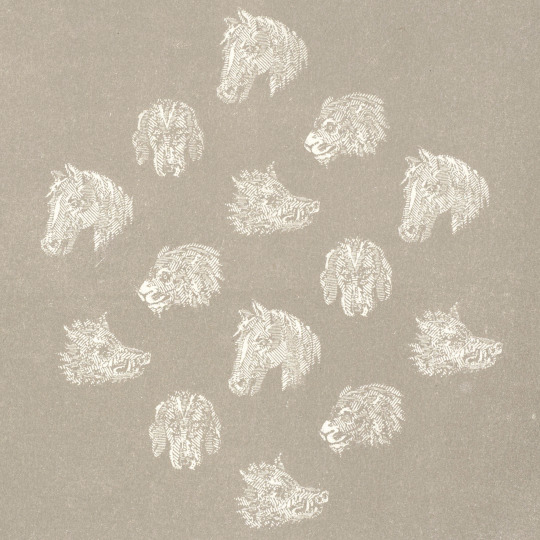
Textile - Lechartier et Paul - 1880 - via The V&A Museum
243 notes
·
View notes
Text
realizing that pleasing business model is legit just whatever the hell the people he hired wanna do like why are they going country in Austin ? because his employees want an excuse to go to Austin for a few weeks.
7 notes
·
View notes
Text
JOUST!
#if you all know things about me#you know i love a joust#didnt get many photos i was there for myself#horseblr#horsblr#horses#horse#joust#renaissance faire#bristol renaissance faire#fyi we like knight maxx hes the yellow motif fellow
291 notes
·
View notes
Text
BEFORE I do a Year of the Dragon piece...
#sidhedust rambles#for science because I see Luana as more of a dragon horse. deer. goat. or unicorn than a straight up eastern dragon#especially b/c of a kirin's power over water/clouds and she kinda has that motif too#but I think a kirin is a good compromise for her especially since they have the eastern dragon's water powers#and a kinda weird funky in between design that Luana also has#I also think the unicorn esque design fits an honorary fairy#but all this being said Luana would make a cool eastern dragon lol. this is just for flavoring. staying in character. even if it isn't cano
10 notes
·
View notes
Text
Swedes are always making fun of Danish for sounding funny, but have you considered the full potential of it? Danish is the perfect (PERFECT) language for comedy songs. No one can beat Danes at comedy songs. We have mastered the art. No songs are funnier than Danish comedy songs.
We got fun for kids
youtube
We got fun for tweens
youtube
We got fun for teens
youtube
We got absurdist humor of all kinds
youtube
youtube
youtube
youtube
youtube
youtube
youtube
#sorry four of the absurdist songs are about horse sex it's a common motif#denmark#the swedes are just jealous that we're funnier than them
7 notes
·
View notes
Text
gonna go write gay orphenoch sex as revenge.
3 notes
·
View notes
Text
Hm. I am renaming one of my fursonas which has me. Thinking About Fursonas. they’re fun to assign :)
#Éomer would be a draft horse I think.#specifically a Jutland. thinking abt their furry legs :)#I also quite like the idea of sth antlered for Faramir. possibly an elk?#or a red deer. I think it would be fun for him to have flowers in his antlers since he’s got such significant floral motifs as is
2 notes
·
View notes
Text
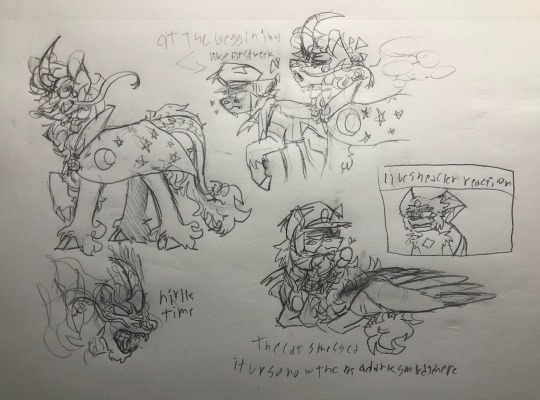
I keep forgetting to post this but. Kirin melli ft some highlandshipping bc they live in my head rent free
#warden melli#subway boss ingo#highlandsshipping#i based Nellis design off of Japanese kirins!! and I made them look a bit more draconic#*melli. god I hate autocorrect but I don’t wanna turn it off#Theres also a bit of a Moon motif goin on in their design bc I think it would be funny if in this au they were somehow trixies ancestor#anyways ingo is just a very scruffy modern day Pegasus when they get sent to hisui#i think ab this au a lot honestly#anyways idk if my horse anatomy is better in this or not. I can never tell
64 notes
·
View notes
Text
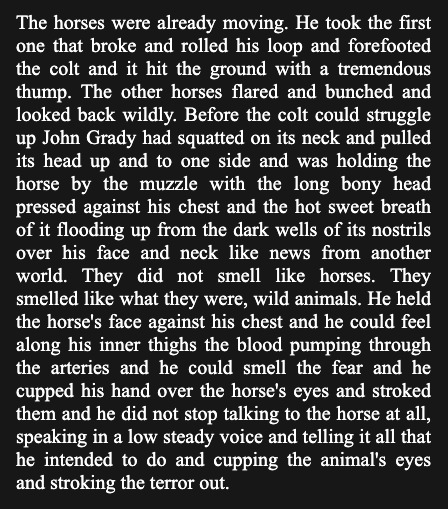
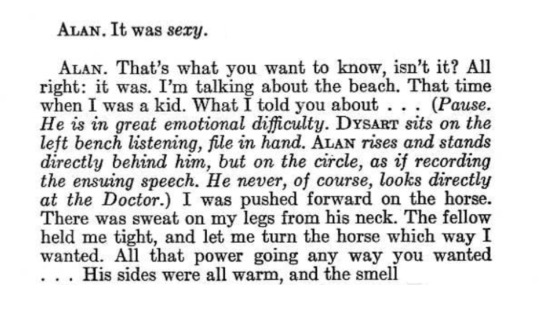
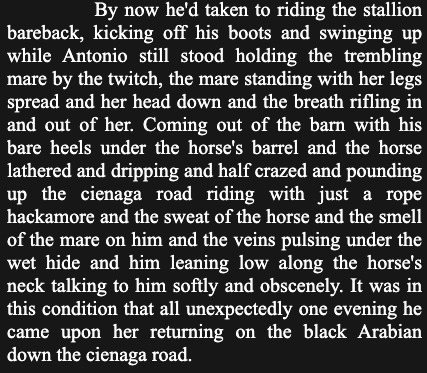
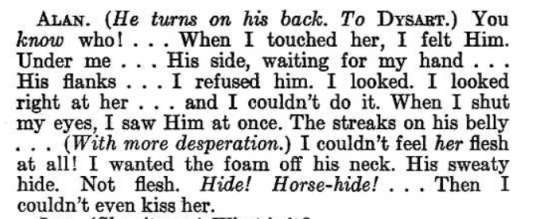
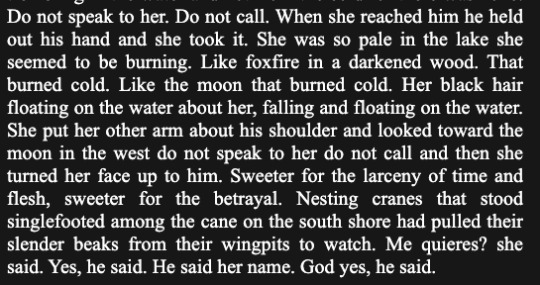
All the Pretty Horses vs Equus
#them wild sons of guns they loved horses#the way john grady cole is a realized alan strang#hes a real cowboy who fucks real girls... and what does it get him lol#both of these characters relative to eachother generally.... john gradys absent mom alans smothering one.#this was a fun book and movie to consume back to back. horseboys 4 life#we love to think about motifs and shit
6 notes
·
View notes